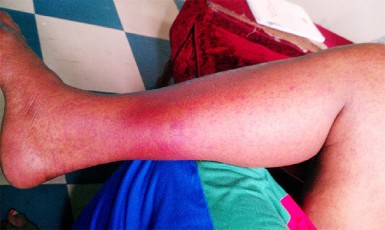A city school teacher is among persons recently diagnosed with the chikungunya virus and she says health authorities need to do more work to educate the population about the virus, while citizens need to make a conscious effort toward keeping their surroundings clean.
Ann Mentis, 29, has been confined to her home because of the severe joint pains she is experiencing as a result of the virus.
Chikungunya is carried by the aedes aegypti mosquito and in addition to severe joint pains its symptoms include sudden high fever, headaches and rashes. The disease is very similar to dengue fever and usually surfaces between four to seven days after a bite from

an infected mosquito.
Mentis, a resident of Howes Street, Charlestown, said she started feeling an acute pain in her left knee last Friday but told herself that it was nothing. However, when she woke up the next morning, she was unable to walk on her left foot. “I would never forget that spot where this thing started,” she said.
Mentis recalled the pain spreading to her neck, shoulders, back and ankles and she began to experience severe headaches. “As the days passed, the headaches got worse,” she said. Soon after tiny red spots began to break out on her arms. She said her fingers also began to hurt. “To this day, the finger tips still hurting,” she added.
She said she went to the outpatient department of the Georgetown Public Hospital, where a doctor told her that she had the symptoms of chikungunya.
She stated that she was given pain killers for the pains and a cream for the rash but no one took any blood samples from her. “They were supposed to do a blood test but they didn’t tell me anything,” she said, while noting that she was aware that Guyana did not have technicians to test for the virus and that samples were sent to Trinidad. “It was weird that they didn’t take any samples from me,” she said.
Mentis stated further that prior to contracting the viral disease, she was uninformed about its symptoms.
PAHO Country Representative Dr. William Adu-Krow recently told Stabroek News that the increase of the virus in Guyana has caused the health authorities to stop testing for the virus in the labs and they had instead diverted to using a syndromic approach by treating on presentation of the symptoms.
He said there were 81 confirmed cases of the virus and 500 suspected cases and had expressed concerns about the public’s awareness about it. He said even though the health authorities have done a lot, there was still more to be done. “I don’t think we have done enough health education, health promotion and risk reduction,” he added.
He said he had spoken to Dr. James Hospedales, the Caribbean Public Health Agency (CARPHA) Director, and the doctor had stated that the spread was “so crippling, if we don’t take care we would have a sizable population of the workforce at home.”
He said PAHO was doing its best to offer assistance to the health authorities and to educate the population about the viral disease and as such has offered the Ministry of Health scholarships for two laboratory technicians to study at CARPHA in Trinidad.
Meanwhile, CARPHA has stated that the number of confirmed cases of chikungunya has risen to 9,640, with 1,157 cases arising from 20 CARPHA Member States and 8,483 cases from 11 other countries/territories. The death toll remains at 37.
The virus is in its 37th epidemiologic week and as it continues to spread, health authorities are asking citizens to use insect repellents and wear long sleeved shirts and long pants. Citizens are also advised to sleep under mosquito nets and keep their surroundings clean so as to prevent the vector from breeding.




